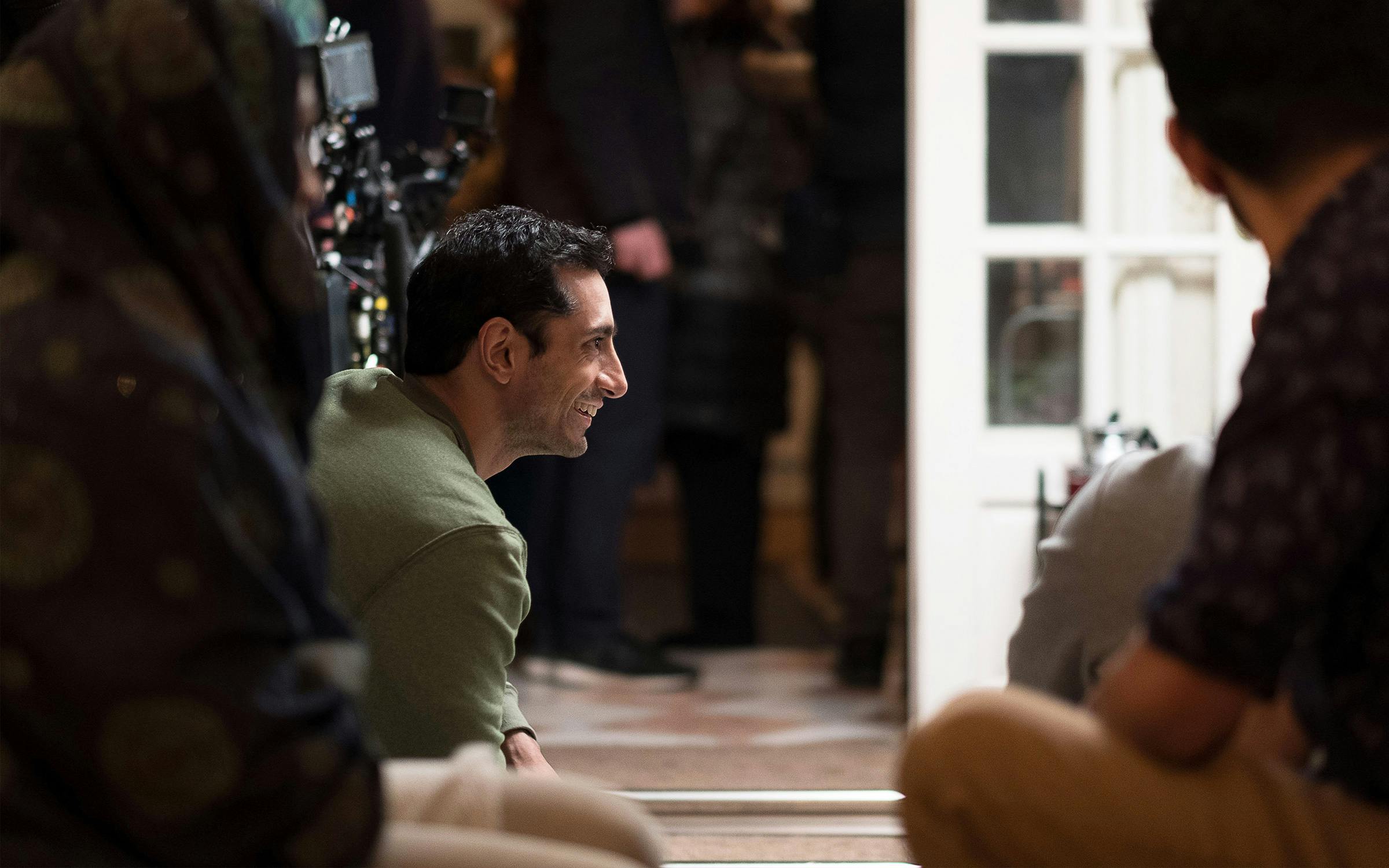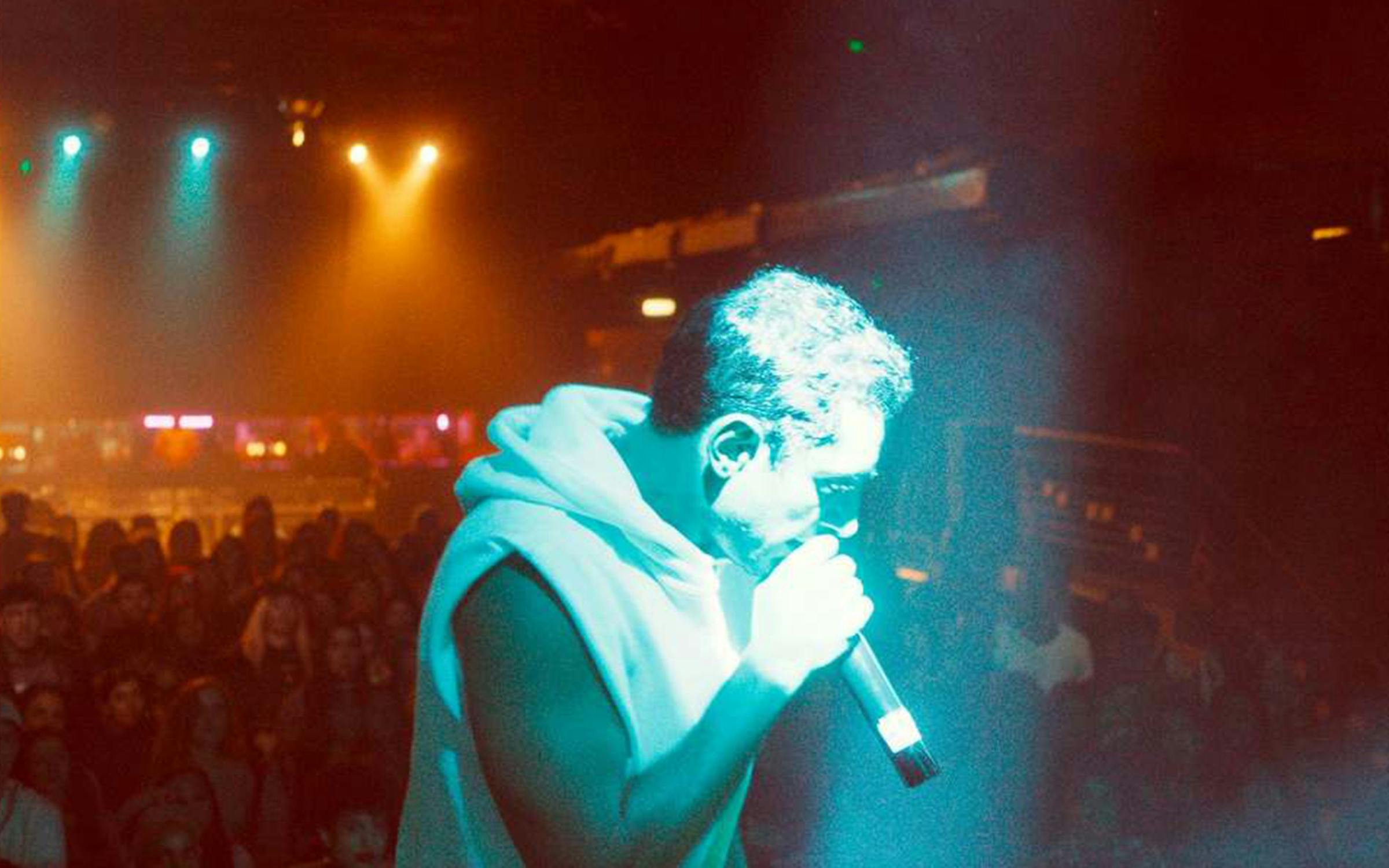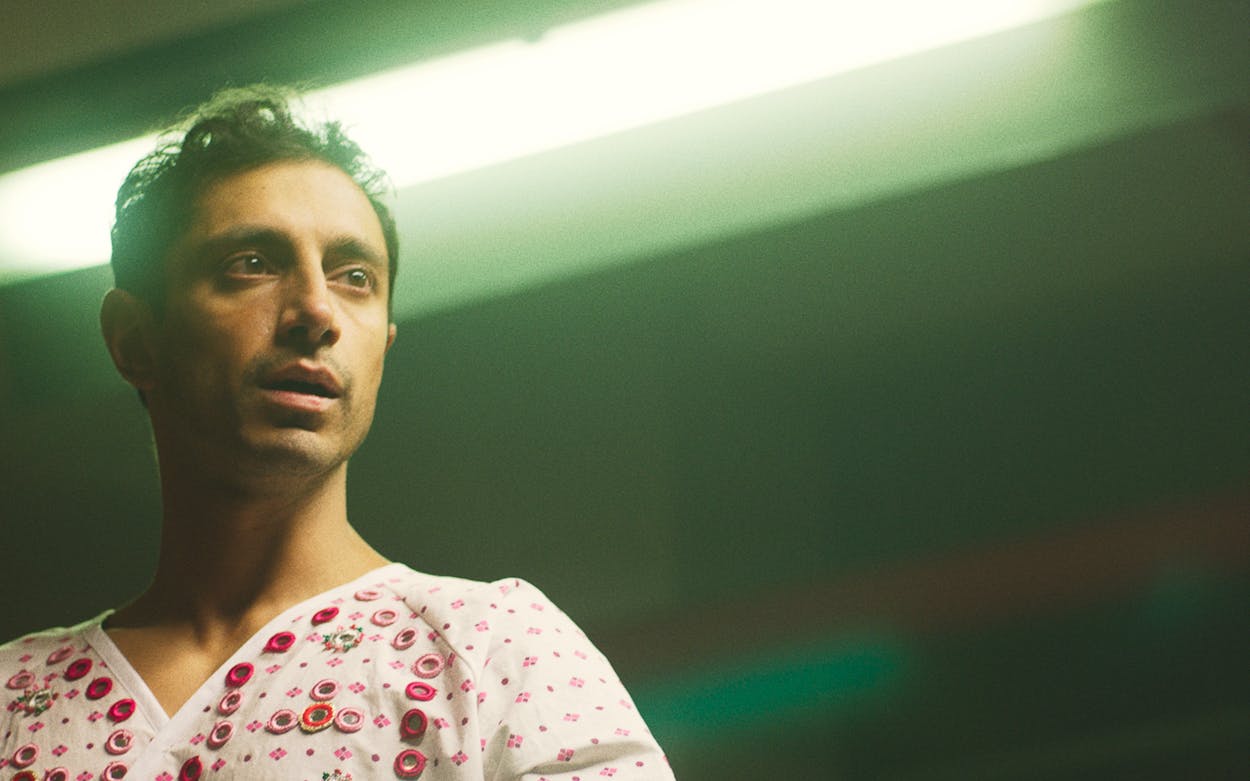In Bassam Tariq’s new film Mogul Mowgli, a rapper named Zed goes through his childhood bedroom, listening to cassettes of raps he’d taped over his father’s traditional Pakistani music. He’s made a quick trip home before embarking on what could be a potentially life-changing tour, surrounded by relics of his father’s past businesses.
The British-Pakistani rapper and Rogue One: A Star Wars Story actor Riz Ahmed, who cowrote the story with Tariq, plays Zed in the film; in it he wrestles with his past, his family history, and a debilitating autoimmune disorder that wrecks his muscles, rendering him helpless as he wants to progress in his career. His self-doubt—about being a rapper who draws on his heritage to create music, while also being accused of being “coconut” (a derogatory term for South Asians who assimilate into Western cultures)—begins to manifest itself in the form of a singing flower-masked spiritual figure.
Tariq’s film, which makes its Texas debut at the Houston Cinema Arts Festival this week in a drive-in screening, is the Houston-bred documentarian’s first narrative film, and marks an exciting shift for his career. The 34-year-old Muslim American filmmaker and screenwriter was born in Pakistan and partly raised in Queens, New York. When he was ten years old, he and his family relocated first to the southwest Houston suburbs. The move from New York to Texas was a difficult transition. “I never really found a place here, to be honest,” he says.
His family’s later move to Sugar Land in the city’s suburbs was Tariq’s “first time being around white people,” as well as Desis and South Asians who were more affluent than his working-class family. “It’s a very different vibe,” he says of the experience. (Sugar Land was also the setting of his 2019 short documentary Ghosts of Sugar Land, a Sundance jury award winner.)
While Tariq was pursuing his undergraduate studies at the University of Texas at Austin, a friend offered to lend and teach him how to use a video camera. For the next several years, Tariq filmed promotional videos for the college and mosques around Austin. While he’s always been interested in experimental film and musical pursuits, the camera held more of a utilitarian purpose for him. “I didn’t see it as an art post-college,” he says of the film. “I was always trying to find a way to make money, because I was always so broke.” Later, he found himself moved after seeing Iranian films including Abbas Kiarostami’s Taste of Cherry; in these pictures, he saw the “breadth of what global cinema is, and how it can really tell stories outside of this little bubble of wherever I am.”

After Tariq graduated, he moved back to New York City in 2008, and was brought into the city’s filmmaking community through his friends Omar Mullick and Musa Syeed, when he worked for an advertising agency. “[Syeed] showed me another way to live outside of just being a nine-to-fiver,” he says. “To see somebody that is deeply ethical and has been unapologetically Muslim…I was so honored to be around these people that really helped me forge my map of how to build whatever the hell I’m building.”
From there, Tariq continued to explore both his identity as a Muslim American and the community he was a part of. He and a friend embarked on a project, 30 Mosques in 30 Days, where they spent each evening of Ramadan at a different mosque—first in New York and then across the United States, from 2009 to 2011. He followed that by codirecting a documentary with Mullick in 2013, These Birds Walk, which follows runaway children in Karachi.
It was around that time that Tariq also crossed paths with Ahmed, who was a fan of the documentary. In 2015, they met while Ahmed was filming his soon-to-be-hit HBO miniseries The Night Of and Tariq was in the first year of running his New York–based halal butcher shop Honest Chops, which he cofounded and still operates with two other friends (Tariq has since moved back to Houston with his own family). When he met Ahmed, though, something clicked. “It was like, ‘holy shit, this guy is very similar to me.’ There’s something quite magnetic,” Tariq says.

Tariq and Ahmed realized they wanted work together on a project, but it took a few years for them to figure out what that would look like. They went to Pakistan together in 2018 to see what would percolate—”What is this thing that we’re building?” they asked themselves—initially intending to set their future project in that country. They filmed a a music video there, but not the film they were intending. (In the meantime, Tariq shot and filmed Ghosts of Sugar Land, about a man who became a radical Muslim.) Eventually, they settled on the story of Mogul Mowgli; the title is draws on a song by Ahmed’s hip-hop group Swet Shop Boys. Their resulting collaboration, which they filmed in 2019, puts out their shared experiences of being part of the South Asian diaspora and trying to make places for themselves in the world.
Mogul Mowgli’s Texas premiere—it’s screening virtually through November 14 after its drive-in debut—is taking place in a different environment from what Tariq had imagined. “I’m curious to know if people respond to it,” he says. “It’s going to be really interesting to see if we could connect with it at all.” Tariq hopes that the film can allow viewers to make peace with their own missteps, particularly in creative fields. “The process of experimenting is so exciting to me,” he says. “If I can give permission to some other young brown boy or girl or whomever to make these mistakes and feel like they have permission to trip up and not make a perfect film,” it’ll be worth it to Tariq, since “it helps expand the language of cinema.”
This notion calls back to one of the central tensions of Mogul Mowgli: As he struggles with his illness, Zed becomes fixated on how he will keep his own legacy alive, rather than accepting that a younger rapper will take his place. “It’s not about how will I be remembered,” Zed says in the film. “But what will I pass on?”
- More About:
- Film & TV






